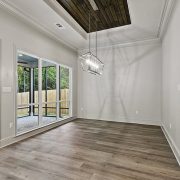Questions To Ask Your Homebuilder When It Comes to the Foundation
It is a great adventure to take when it comes to building a new home. There are many exciting decisions to make on building materials, floorplans, etc. The home’s foundation is not one of the components that most homeowners want to think about. The foundation is what your home is literally built on and is the most critical part of the home-building process. Since you only get one chance to do it right, the professionals in the industry suggest asking your building these five questions. 
1. What type of foundation will I have for my home?
There are three foundation types to choose from, slab-on-grade, crawl space or basement. Some homes found around the country can have a combination of the types of foundations. The foundation of your home will be based on where you live, the climate, and the local soil and moisture conditions. If you live in a colder climate, then the frost line will be important to factor into your decision-making.
When determining the foundation type, your builder can use a geotechnical report to help with the decision on what foundation is best. A geotechnical report will provide the builder with soil data to ensure that the appropriate design is used. In all three options, moisture management is the key.
2. How will my home be protected from liquid water?
As mentioned before, moisture management is the key. The goal is to keep liquid water out of your home. Moisture seeping through into your home, can hurt the foundation, dampen your comfort level and cause a potential health problem. Water doesn’t just come from mother nature, in some climates bulk water pressure from a water table going up and down can cause problems as well as landscaping irrigation.
There are many ways your builder can design your foundation area and products they can use to help repel liquid moisture. There are different building codes in specific areas around the country. Your builder will be familiar with your areas’ minimum building code requirements. You will want to always make sure you have the proper grading around your home so that water never becomes a hindrance.
3. How will my home be protected from soil vapor?
Soil vapor can seep into any type of foundation in any location into a home’s envelope. The natural flow of water vapor is to move from greater concentration to lesser concentration called diffusion. Your foundation needs to be checked to make sure this is not happening. If it goes unchecked, it can lead to issues with floor coverings, coating failures, mold growth and overall poor indoor quality. It can also cause your HVAC system to not run properly.
Water vapor can be just as menacing as liquid water but protecting your home from water vapor is different from protecting your home from liquid water. Remember to ask your home builder what steps they will take to make sure there is no diffusion of water vapor under your home. Builders can use a water vapor barrier under a slab foundation or overexposed earth in a crawl space.
4. What about comfort and efficiency?
A home needs to be both comfortable to live in and energy efficient. Homeowners turn to solar panels, air conditioning and insulation to make a home more energy efficient. The comfort level in your home actually starts below the living space. If you live in a colder climate, then the home’s foundation will need to be insulated. Even if you live in a milder climate, having your foundation insulated can help maintain comfortable temperatures and keep utility bills down.
5. What products do you use?
Choosing the right products can make a huge impact. Choosing the correct foundation is a big deal because it is hard to replace a foundation once it is installed. If you do have to replace a foundation, it is very costly and can affect other systems throughout your home.
Builders know all the ends and outs of the foundation systems they use in their area. They can explain to you how they work and if they have a warranty or if your home buyer warranty package includes the foundation.
Remember the construction of the foundation of your home is very important. Talk with your builder and get familiar with the choices. Understanding what goes on with the foundation helps to give you peace of mind to know that everything is working as it should.



